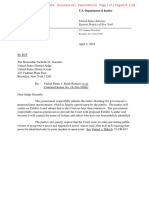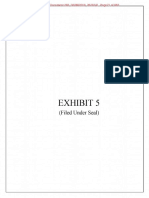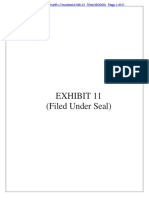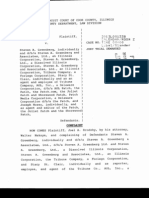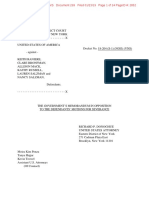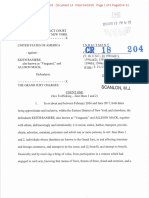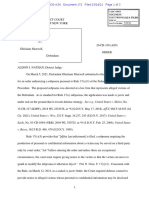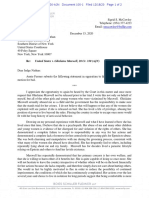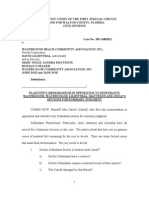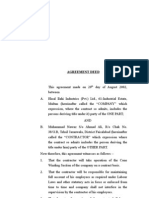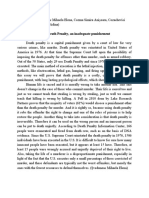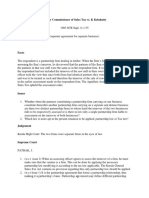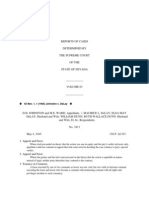Cosby Deposition Decision
Cosby Deposition Decision
Uploaded by
Jim KinneyCopyright:
Available Formats
Cosby Deposition Decision
Cosby Deposition Decision
Uploaded by
Jim KinneyOriginal Description:
Original Title
Copyright
Available Formats
Share this document
Did you find this document useful?
Is this content inappropriate?
Copyright:
Available Formats
Cosby Deposition Decision
Cosby Deposition Decision
Uploaded by
Jim KinneyCopyright:
Available Formats
Case 3:14-cv-30211-MGM Document 146 Filed 12/31/15 Page 1 of 12
UNITED STATES DISTRICT COURT
DISTRICT OF MASSACHUSETTS
TAMARA GREEN, THERESE
SERIGNESE, LINDA TRAITZ,
LOUISA MORITZ, BARBARA
BOWMAN, JOAN TARSHIS, and
ANGELA LESLIE,
Plaintiffs,
V.
CIVIL ACTION
NO. 14-30211-MGM
WILLIAM H. COSBY, JR.,
Defendant.
ORDER
December 31, 2015
Hennessy, M.J.
Currently pending before the court is a motion brought by Camille Cosby (Mrs.
Cosby), wife of defendant William H. Cosby, Jr. (defendant), seeking to quash Mrs. Cosbys
deposition subpoena, or in the alternative, for a protective order (Docket # 127). The motion
relates to a subpoena dated December 9, 2015 directing Mrs. Cosby to testify at a deposition on
January 6, 2016 in connection with the claims brought by the plaintiffs herein (see Docket # 1282). Plaintiffs submitted an opposition on December 21, 2015 (see Docket # 130), and Mrs.
Cosby filed a reply on December 30, 2015 (see Docket # 141). For the reasons set forth below,
Mrs. Cosbys motion is denied in its entirety.
Factual and Procedural Background
This matter was initiated with the filing of plaintiff Tamara Greens complaint on
Case 3:14-cv-30211-MGM Document 146 Filed 12/31/15 Page 2 of 12
December 10, 2014 (Docket # 1). 1 Since that time, six more individuals have been named as
plaintiffs, and several amended complaints have been filed. Most recently, on November 13,
2015, the seven plaintiffs named herein filed the Third Amended Complaint (TAC) (Docket #
109). The TAC alleges that defendant drugged and/or sexually assaulted each of the plaintiffs at
various times between 1969 and 1992 (see id. at 11-27, 43-53, 58-64, 69-74, 79-83, 90-104,
109-16). Per the TAC, in or around February 2005 and again in February 2014, plaintiff Green
publically disclosed defendants alleged assault. Id. at 28, 30. Plaintiffs allege that in
response to both statements, defendant directly, and vicariously by and through his actual
and/or apparent authorized representative[s], [lawyer, agent,] servant[s], and/or employee[s]
issued his own public statements denying the allegations. Id. at 29, 32. They further state that
Greens accusations resurfaced in the media in late 2014, around the same time that the other six
plaintiffs made public statements concerning the allegations described above. See id. at 33,
54, 65, 75, 84-86, 105, 117. Defendant allegedly responded by issuing, through individuals
speaking on his behalf, a series of statements once again denying the accusations. See id. at
34, 36, 37, 40, 57.
Defendants responsive statements are the predicate for the instant lawsuit. Plaintiffs
claim that their original accusations were accurate and as such that defendants statements
denying the accusations were false and defamatory. To this end, the TAC brings a total of
twenty-eight claims sounding in defamation, invasion of privacy (false light), and intentional
infliction of emotional distress. On December 14, 2015, defendant submitted his Answer to the
TAC, which included counterclaims sounding in defamation per se, defamation, tortious
By order dated April 28, 2015, the Honorable Mark G. Mastroianni referred this case to the undersigned
for [f]ull [p]retrial. See Docket # 58.
2
Case 3:14-cv-30211-MGM Document 146 Filed 12/31/15 Page 3 of 12
interference, and intentional infliction of emotional distress. See generally Docket # 121 at pp.
77-88.
Camille Cosby
Camille Cosby is not a party to this action. Based on the parties representations, she is
defendants wife of approximately fifty-two years and has served as defendants business
manager. See Docket # 128 at pp. 2, 6; Docket # 130 at p. 2. On December 9, 2015, defendants
counsel 2 sent an email to plaintiffs counsel confirming his authority to accept service of a
subpoena on behalf of Mrs. Cosby with full reservation and without waiver of any of her rights,
including filing a motion to quash and/or seeking a protective order. See Docket # 128-1. The
subpoena, which is dated the same day, directs Mrs. Cosby to appear for a deposition on January
6, 2016. See Docket # 128-2.
Mrs. Cosby now seeks an order quashing the subpoena, or in the alternative, a protective
order limiting its scope. She argues that Massachusettss marital disqualification law renders her
incompetent to testify in this matter and that even if she could provide admissible testimony, the
value of any such information is outweighed by the undue burden that her deposition would
effect. As discussed below, I find no merit in Mrs. Cosbys arguments, and accordingly deny her
motion in its entirety.
I note that Messrs. Egan and Searcy, counsel for defendant, did not enter notices of appearance on
behalf of Mrs. Cosby until December 21, 2015 and December 22, 2015, respectively; roughly two weeks
after the email described above and more significantly, several days after the filing of the instant motion.
While Local Rule 83.5.2(a) provides that [t]he filing of an appearance or any other pleading signed on
behalf of a party constitutes an entry of appearance for that party, the instant motion is not a pleading,
and as such, it technically was filed before Mrs. Cosbys now-attorneys had entered appearances on her
behalf. However, in light of (1) the notices of appearance that shortly followed the filing of this motion;
(2) the relationship between Mrs. Cosby and defendant (on whose behalf Messrs. Egan and Searcy have
long since entered appearances); (3) Local Rule 83.5.2(a)s applicability to pleadings; and (4) the fact that
plaintiffs have neither been prejudiced by nor raised this issue, this minor procedural consideration will
not interfere with my disposition of the instant motion on its merits.
3
Case 3:14-cv-30211-MGM Document 146 Filed 12/31/15 Page 4 of 12
Legal Standard
Fed. R. Civ. P. 45 provides that on a timely motion, a court must modify or quash a
subpoena that, inter alia, (1) requires disclosure of privileged or other protected matter, if no
exception or waiver applies; or (2) subjects a person to undue burden. Fed. R. Civ. P.
45(d)(3)(A)(iii-iv). A Rule 45 subpoena must fall within the scope of proper discovery under
Fed. R. Civ. P. 26(b)(1). In re New England Compounding Pharmacy, Inc. Products Liab.
Litig., No. MDL 13-2419, 2013 WL 6058483, at *4 (D. Mass. Nov. 13, 2013) (citing Miller v.
Allstate Fire & Cas. Ins. Co., No. 07 Civ. 260, 2009 WL 700142, at *2 (W.D. Pa. Mar. 17,
2009)). This scope is decidedly broad. As the court in the Compounding Pharmacy litigation
explained,
Rule 26(b) permits discovery regarding any nonprivileged matter
that is relevant to any party's claim or defense . . . or discovery of
any information that appears reasonably calculated to lead to the
discovery of admissible evidence. 3 Rule 26(b)(1) generally permits
liberal discovery of relevant information. As the Supreme Court has
instructed, because discovery itself is designed to help define and
clarify the issues, the limits set forth in Rule 26 must be construed
broadly to encompass any matter that bears on, or that reasonably
could lead to other matters that could bear on, any issue that is or
may be in the case.
I note that this portion of Rule 26(b) was amended on December 1, 2015. The current version provides,
in relevant part, that [p]arties may obtain discovery regarding any nonprivileged matter that is relevant to
any party's claim or defense and proportional to the needs of the case. Fed. R. Civ. P. 26(b)(1). The
Supreme Court has ordered that the revised rules shall govern in all proceedings in civil cases thereafter
commenced and, insofar as just and practicable, all proceedings then pending. Wertz v. GEA Heat
Exchangers Inc., No. 14 Civ. 1991, 2015 WL 8959408, at *2 n.1 (M.D. Pa. Dec. 16, 2015) (quoting
Letter of Transmittal to Congress, April 29, 2015).
Case 3:14-cv-30211-MGM Document 146 Filed 12/31/15 Page 5 of 12
Id. (quoting, e.g., Oppenheimer Fund, Inc. v. Sanders, 437 U.S. 340, 351 (1978)) (internal
citations and quotation marks omitted); see also Cherkaoui v. City of Quincy, No. 14 Civ. 10571,
2015 WL 4504937, at *1 (D. Mass. July 23, 2015) (As a general matter, relevancy must be
broadly construed at the discovery stage such that information is discoverable if there is any
possibility it might be relevant to the subject matter of the action.) (quoting E.E.O.C. v. ElectroTerm, Inc., 167 F.R.D. 344, 346 (D. Mass. 1996)). To this end, it is very unusual for a court to
prohibit the taking of a deposition altogether. E.E.O.C. v. Freudenberg-NOK Gen. Pship, No.
07 Civ. 406, 2009 WL 909571, at *3 (D.N.H. Apr. 3, 2009) (quoting Iris Corp. Berhad v. U.S.,
84 Fed. Cl. 489, 494 (2008)); see also B. Fernandez & Hnos., Inc. v. Int'l Bhd. of Teamsters, 285
F.R.D. 185, 186 (D.P.R. 2012) ([A] party seeking to quash a deposition in its entirety must
show extraordinary or exceptional circumstances.) (citing Prozina Shipping Co., Ltd. v.
ThirtyFour Automobiles, 179 F.R.D. 41, 48 (D. Mass. 1998)).
Discussion
Marital Disqualification
Mrs. Cosby's first argument proceeds on privilege grounds, citing Massachusettss
marital disqualification law, 4 which provides that "[i]n any proceeding, civil or criminal, a
witness shall not testify as to private conversations with a spouse occurring during their
marriage." MA R. Evid. 504. 5 She contends that because she lacks any first-hand knowledge
concerning the events at issue in the TAC, any potentially relevant information would be derived
[I]n a civil case, state law governs privilege regarding a claim or defense for which state law supplies
the rule of decision. Fed. R. Evid. 501. Accordingly, Massachusettss privilege law applies here.
Although Mrs. Cosbys brief cites to M.G.L. c. 233 20, which discusses, inter alia, the prohibition on
spouses testifying as to private conversations, the quoted clause does not appear there. Instead, it appears
in MA R. Evid. 504, which is derived from G. L. c. 233, 20, First. See Note to MA R. Evid. 504.
5
Case 3:14-cv-30211-MGM Document 146 Filed 12/31/15 Page 6 of 12
from her confidential marital communications with Defendant; as such, she submits that she is
incompetent to offer admissible testimony. See generally Docket # 128 at pp. 4-5.
I find no merit in Mrs. Cosby's argument. As she concedes, the marital disqualification
rule is one of disqualification and not of privilege, and therefore concerns a party's competence
to testify. See Com. v. Azar, 32 Mass. App. Ct. 290, 304 (1992). It is settled that "[t]he mere
fact that a party may not be mentally competent to testify is not a sufficient reason to prohibit the
other party from taking his deposition." Dang ex rel. Dang v. Eslinger, No. 14 Civ. 37, 2014 WL
3611324, at *2 (M.D. Fla. July 22, 2014) (citing cases). This is due, at least in part, to the fact
that even though an incompetent witnesss testimony might not be admissible at trial, his
deposition could lead to admissible evidence. See Fjellman v. Forest Hill Co-op., No. 06 Civ.
14470, 2007 WL 1806173, at *3 (E.D. Mich. June 21, 2007); see also Bucher v. Richardson
Hosp. Auth., 160 F.R.D. 88, 93 (N.D. Tex. 1994) ([P]laintiff is not entitled to quash the
deposition merely because J.B. may be incompetent to testify at trial. The right to depose a
witness and the right to use that testimony in court are separate and distinct.) (citing United
States v. International Business Machines Corp., 90 F.R.D. 377, 381 n.7 (S.D.N.Y. 1981)). 6
Although Mrs. Cosby is correct that the rule does not distinguish between testimony in
deposition and testimony at trial, see Docket #141 at p. 2 (internal quotation marks omitted), the
rules underlying characteri.e. competence, not privilegeconcerns admissibility of evidence
at trial, and not a privilege against discovery. To this end, both of the cases Mrs. Cosby cites as
support relate to the admissibility of testimony at trial. See Azar, 32 Mass. App. Ct. at 303-04
(discussing argument that trial judge erred in excluding conversations between defendant and his
Indeed, Fed. R. Civ. P. 26(b)(1) provides that information need not be admissible in evidence to be
discoverable.
6
Case 3:14-cv-30211-MGM Document 146 Filed 12/31/15 Page 7 of 12
wife); Gallagher v. Goldstein, 402 Mass. 457, 458-59 (1988) (same). She has offered no
authority suggesting, let alone establishing, that the spousal disqualification rule may foreclose
her deposition. 7 Accordingly, I reject Mrs. Cosbys first argument in support of quashing her
subpoena.
Undue Burden
Mrs. Cosby next argues that the subpoena should be quashed in light of the requirement
that a party serving a subpoena must take reasonable steps to avoid imposing undue burden or
expense on a person subject to the subpoena. See Fed. R. Civ. P. 45(d)(1). The rule similarly
provides that on a timely motion, the court must quash or modify a subpoena that, inter alia,
subjects a person to undue burden. See Fed. R. Civ. P. 45(d)(3)(A)(iv). Noting that she is a
non-party and therefore, that the concern for the unwanted burden thrust upon [her] is a factor
entitled to special weight, see Cusumano v. Microsoft Corp., 162 F.3d 708, 717 (1st Cir. 1998)
(citing cases), Mrs. Cosby primarily contends that the value of any potentially admissible
information is outweighed by the public interest in protecting marital communications. See
Docket #128 at pp. 5-6. 8 Again, I disagree.
Additionally, even if the marital disqualification rule did apply here, its various exceptions would render
improper a wholesale denial of plaintiffs right to depose Mrs. Cosby. Excepted from the rule, for
example, are situations involving joint criminal activity see, e.g, Com. v. Walker, 438 Mass. 246, 254 n.4
(2002) (citing cases), written communications, see, e.g., Com. v. Szczuka, 391 Mass. 666, 678 n.14
(1984) (citing authorities), and conversations during which third parties are present. See, e.g., Com. v.
Perez, 460 Mass. 683, 698 (2011) (citing cases). Accordingly, even if the rule would apply here (which,
as discussed, it does not), its maximum possible impact would be an exclusion of information falling
outside its exceptions. Particularly in light of the general aversion toward precluding depositions, the rule
would not justify quashing Mrs. Cosbys subpoena.
8
Mrs. Cosby also alludes to the burden of being forced to parse over fifty years of conversations with
her husband into protected communication versus underlying fact see Docket #128 at p. 8 and plaintiffs
counsels communications with the press, which she contends makes clear that they intend to publicize
every lurid detail of every question they intend to ask Mrs. Cosby. See Docket # 141 at p. 3. She does
not, however, explain why these purported burdenswhich presumably exist, respectively, in any action
involving events occurring over an extended period of time and any action involving a public figure
outweigh the potential evidentiary benefits of her deposition.
7
Case 3:14-cv-30211-MGM Document 146 Filed 12/31/15 Page 8 of 12
In examining motions to quash or for a protective order, courts weigh the need of the
party seeking discovery against any undue hardships created by permitting it. In re Methyl
Tertiary, 269 F.R.D. 360, 363-64 (S.D.N.Y.2010). To that end, we consider issues such as
relevance, the requesting partys need, the breadth of the request, and the burden imposed when
analyzing whether a subpoena places an undue burden on a nonparty. Linsday v. C.R. Bard,
Inc., No. 10 MC 441, 2011 WL 240104, at *1 (M.D. Pa. Jan. 24, 2011) (citing Grider v.
Keystone Health Plan Central, Inc., No. 05 MC 40, 2005 WL 2030456 (M.D. Pa. July 28,
2005)). Most significantly for present purposes, [t]he party resisting discovery bears the burden
of showing that the subpoena imposes an undue burden, and it cannot rely on a mere assertion
that compliance would be burdensome and onerous without showing the manner and extent of
the burden and the injurious consequences of insisting upon compliance. Compounding
Pharmacy, 2013 WL 6058483, at *6 (quoting Sterling Merchandising, Inc. v. Nestle, S.A., No.
06 Civ. 1015, 2008 WL 1767092, at *2 (D.P.R. Apr. 15, 2008)); see also Rockstar Consortium
US LP, No. 14 Civ. 91322, 2015 WL 5972422, at *5 (D. Mass. Oct. 14, 2015) (quoting
Compounding Pharmacy); Biological Processors of Alabama, Inc. v. N. Georgia Envtl. Servs.,
Inc., No. 09 Civ. 3673, 2009 WL 1663102, at *1 (E.D. La. June 11, 2009) (When the
burdensomeness of a subpoena is at issue, the onus is on the party who alleges the burden to
establish the burden with specificity . . . .), modified on reconsideration, No. 09-3673, 2009 WL
2160984 (E.D. La. July 15, 2009).
Initially, as a procedural matter, Mrs. Cosby has not submitted an affidavit or any other
evidence demonstrating her purported burden, a shortcoming which some courts have deemed
fatal to a grant of the relief sought herein. See, e.g., Aristocrat Leisure Ltd. v. Deutsche Bank
Trust Co. Americas, 262 F.R.D. 293, 300 (S.D.N.Y. 2009) (internally citing 9 James Wm. Moore
Case 3:14-cv-30211-MGM Document 146 Filed 12/31/15 Page 9 of 12
et al., Moore's Federal Practice 45.51[4] (3d ed. 2009) that [a] party objecting to a subpoena
on the ground of undue burden generally must present an affidavit or other evidentiary proof of
the time or expense involved in responding to the discovery request and denying motion to
quash in the absence of an affidavit to this effect). This alone may suffice to deny Mrs. Cosbys
undue burden argument.
However, setting aside this omission, Mrs. Cosbys argument nonetheless fails as a
substantive matter. It proceeds by highlighting considerations which, according to her, fall short
of justifying her appearance at a deposition. Specifically, she states that neither her role as
defendant's business manager nor her December 15, 2014 statement in support of her husband
both of which, according to Mrs. Cosby, have been offered by plaintiffs as reasons why they
should take Mrs. Cosbys deposition, see Docket #128 at p. 1warrants her appearance. This
argument, which is not supported by citation to any authority, rests upon a misapprehension of
the applicable standard. As noted, it is beyond dispute that Mrs. Cosby bears the burden of
demonstrating an undue burden that justifies quashing her subpoena. By asserting that her role
as defendant's business manager has no bearing on any damages Plaintiffs claim to have
suffered and that nothing in the [December 15, 2014] statement claims to have any special
insight into the claims at issue before this Court, see Docket #128 at pp. 6-7, she has impliedly
sought to shift this burden to plaintiffs, asking them to justify her deposition. Therefore, these
assertions, even if true, would be of no moment, since it is not plaintiffs burden to establish why
the subpoena should not be quashed; instead, it is Mrs. Cosbys burden to show why it should.
See supra.
Mrs. Cosby has made no such showing. As noted, she argues that her subpoena threatens
the strong public interest in encouraging the protection of marital communications and
Case 3:14-cv-30211-MGM Document 146 Filed 12/31/15 Page 10 of 12
mentions in passing the shame and embarrassment of responding to questions about
[defendants] alleged infidelities and sexual misconduct. See Docket #128 at pp. 5-6, 8. While
these are not unimportant considerations, they do not outweigh the potential significance of Mrs.
Cosbys testimony, nor has Mrs. Cosby provided any authority that they do. To the contrary, the
combination of (1) the allegations underlying this matter, which implicate, inter alia, defendants
sexual history and his attempts to conceal his actions from the public; and (2) Mrs. Cosbys dual
role as defendants wife and business manager, render it at least plausible that Mrs. Cosby is in
possession of information that is relevant to any partys claim or defense and proportional to the
needs of the case. See Fed. R. Civ. P. 26(b)(1). This more than suffices to outweigh any
purported burden that will be imposed upon her by dint of her having to testify.
Mrs. Cosbys related contention, that any knowledge she may have about the allegations
of the TAC would have come through Defendant which would be inadmissible and cumulative
of defendants deposition, and therefore that [p]laintiffs will obtain nothing of additional
relevance or value by forcing Mrs. Cosby to testify, is incorrect. First, because, as discussed
above, the marital disqualification law does not apply here, there is nothing precluding her
deposition as a tool to discover information gleaned from conversations between Mrs. Cosby and
the defendant. Additionally, because discovery is barely underway, there is simply no way
(outside of counsels unsworn and unsupported assertions) to concludeas Mrs. Cosby wishes
this court to dothat the information elicited from Mrs. Cosby will, in all respects, mirror that
provided by the defendant. Indeed, defendant himself is yet to testify; as such, this argument
presupposes not only defendants own testimony as well as that of Mrs. Cosby, but that the two
will be entirely consistent, rendering the latter unnecessary.
10
Case 3:14-cv-30211-MGM Document 146 Filed 12/31/15 Page 11 of 12
Mrs. Cosby does not point to a single case where, as here, no deposition testimony has
been taken, and a court nevertheless quashed a subpoena on the ground that discovery would be
cumulative. Instead, she cites one case, Ameristar Jet Charter, Inc. v. Signal Composites, Inc.,
244 F.3d 189 (1st Cir. 2001), that serves to highlight the flaw in her argument. In Ameristar, the
First Circuit upheld an order quashing subpoenas for the testimony of three employees of GEAE,
a non-party. See id. at 193. Significantly, though, those subpoenas followed the depositions of
two GEAE employees, and the party seeking the additional depositions did not articulate any
dissatisfaction with the testimony it received. Id. Because that party had an opportunity to
question GEAE representatives and did so in March, 1999 and has not shown that the
information sought from [the new deponents] would be anything but cumulative or duplicative,
the court held that it would be an undue burden on GEAE, a non-party, to permit such a
fishing expedition. Id. Of course, the same does not hold true here, where (1) Mrs. Cosby
and defendant are not employees of the same company; and (2) plaintiffs have not yet taken any
testimony of which Mrs. Cosbys might be cumulative or duplicative.
Finally, a recent decision from the Northern District of Georgia, Gaylor v. Georgia Dep't
of Nat. Res., No. 11 Civ. 288, 2014 WL 4215575 (N.D. Ga. Aug. 25, 2014), is instructive. In
Gaylor, the defendant served a deposition subpoena on the plaintiffs wife, a non-party, who
moved to strike, inter alia, on the grounds that any potentially relevant information she could
provide is available from a more convenient and less burdensome source, namely, Plaintiff
himself and that her deposition would be unlikely to produce relevant non-cumulative
information because the federal common law marital confidential communications privilege
would prevent her from testifying about any confidential conversations she had with Plaintiff.
See id. at *7. The court disagreed, writing in language equally applicable here that the non-party
11
Case 3:14-cv-30211-MGM Document 146 Filed 12/31/15 Page 12 of 12
failed to show that her deposition testimony would be unreasonably cumulative or duplicative
or that sitting for a deposition would impose an undue burden. Even assuming the marital
communications privilege applies in this case, Mrs. Gaylor may have knowledge of relevant
information that is not subject to the privilege. See id.; see also footnote 7, supra. Finding the
Gaylor courts reasoning to apply here, and in the absence of any persuasive authority to the
contrary, I reject Mrs. Cosbys argument that her subpoena should be quashed on the grounds
that it presents an undue burden.
Protective Order
In the alternative, Mrs. Cosby has requested that the court issue a protective order in
connection with her deposition. Her motion papers do not, however, specify the scope of her
requested protection, writing only that the court should protect Mrs. Cosby from unnecessary
harassment by limiting the scope of her subpoena. In her reply, she requests (for the first time)
that the court enter a protective order staying her deposition at least until the parties and
Defendants purported spokespeople have been deposed. See Docket #141 at p. 5. Neither at
the November 30, 2015 scheduling conference nor in her original moving papers did Mrs. Cosby
raise the issue of these depositions preceding hers, and in any event, I am not persuaded that such
relief is warranted. Accordingly, Mrs. Cosbys request for a protective order is denied.
CONCLUSION
For the reasons set forth herein, Mrs. Cosbys motion seeking to quash her deposition
subpoena, or in the alternative, for a protective order (Docket # 127) is denied in its entirety.
/s/ David H. Hennessy
David H. Hennessy
United States Magistrate Judge
12
You might also like
- Wk6Wuhhw6Xlwh 'Hqyhu&Rorudgr: 'HSRVLWLRQDocument22 pagesWk6Wuhhw6Xlwh 'Hqyhu&Rorudgr: 'HSRVLWLRQkc wildmoonNo ratings yet
- Jamie Dimon Deposition in U.S. Virgin Islands v. JP MorganDocument418 pagesJamie Dimon Deposition in U.S. Virgin Islands v. JP MorganTaste SubjectiveNo ratings yet
- New Valley Bank & Trust Public Co. FileDocument91 pagesNew Valley Bank & Trust Public Co. FileJim KinneyNo ratings yet
- PG 14, DKT 853: Daniela Testifies No Intent To Bring Civil SuitDocument1 pagePG 14, DKT 853: Daniela Testifies No Intent To Bring Civil SuitMake Justice BlindNo ratings yet
- Nxivm Doc 491: Juror QuestionnaireDocument39 pagesNxivm Doc 491: Juror QuestionnaireTony Ortega100% (2)
- Stavola Asphalt Company ComplaintDocument87 pagesStavola Asphalt Company ComplaintAsbury Park PressNo ratings yet
- USDA Responses To Senator Richard Blumenthal Re Beulah and KarenDocument3 pagesUSDA Responses To Senator Richard Blumenthal Re Beulah and KarenJim KinneyNo ratings yet
- Saratoga Race Course MapDocument1 pageSaratoga Race Course MapJim KinneyNo ratings yet
- Farris v. Glen AldenDocument3 pagesFarris v. Glen AldenRudejane TanNo ratings yet
- Pre Trial Brief Unlawful DetainerDocument3 pagesPre Trial Brief Unlawful DetainerJom IlaoNo ratings yet
- Tenth Cosby UnsealedDocument42 pagesTenth Cosby UnsealedDeadspinNo ratings yet
- Preska Order On Dershowitz Access To Epstein FilesDocument6 pagesPreska Order On Dershowitz Access To Epstein FilesLaw&Crime100% (1)
- Fifth Cosby UnsealedDocument15 pagesFifth Cosby UnsealedDeadspinNo ratings yet
- Fourteenth Cosby UnsealedDocument22 pagesFourteenth Cosby UnsealedDeadspinNo ratings yet
- Giuffre V Maxwell Declaration To Motion To Unseal - OppositionDocument11 pagesGiuffre V Maxwell Declaration To Motion To Unseal - OppositionOTDC100% (1)
- Ghislaine Maxwell'S Motion To Preclude Law Enforcement Witnesses From Offering Expert Opinion TestimonyDocument10 pagesGhislaine Maxwell'S Motion To Preclude Law Enforcement Witnesses From Offering Expert Opinion TestimonyTalkLeftNo ratings yet
- Giuffre v. Maxwell - Deposition - May 3, 2016Document48 pagesGiuffre v. Maxwell - Deposition - May 3, 2016NEWS CENTER Maine100% (2)
- R Kelly Jury MotionDocument16 pagesR Kelly Jury MotionTodd FeurerNo ratings yet
- Exhibit 11 (Filed Under Seal)Document23 pagesExhibit 11 (Filed Under Seal)K A100% (2)
- Joel Brodsky Lawsuit Against Patch, Chicago Tribune and OthersDocument31 pagesJoel Brodsky Lawsuit Against Patch, Chicago Tribune and OthersOrlandParkParchNo ratings yet
- Maxwell Bail Reply MemoDocument18 pagesMaxwell Bail Reply MemoTechno FogNo ratings yet
- Giuffre v. Maxwell Documents (July 2020)Document626 pagesGiuffre v. Maxwell Documents (July 2020)The Fashion Law100% (1)
- Giuffre V Maxwell Dershowitz Declaration To InterveneDocument18 pagesGiuffre V Maxwell Dershowitz Declaration To InterveneOTDCNo ratings yet
- United States District Court Southern District of New YorkDocument10 pagesUnited States District Court Southern District of New YorkJennifer Van LaarNo ratings yet
- Prosecution Memo Against Separate TrialsDocument24 pagesProsecution Memo Against Separate TrialsTony OrtegaNo ratings yet
- Maxwell MTDDocument8 pagesMaxwell MTDLaw&Crime100% (1)
- Epstein FilingDocument14 pagesEpstein FilingCasey FrankNo ratings yet
- Preska Order On Sealed Epstein MaterialsDocument5 pagesPreska Order On Sealed Epstein MaterialsLaw&Crime100% (1)
- Second Amended Complaint (Redacted)Document76 pagesSecond Amended Complaint (Redacted)Victor I NavaNo ratings yet
- Mack / RaniereDocument5 pagesMack / RaniereBill Taylor67% (3)
- HILLDABEAST JW v. State Karin Lang Deposition 01363Document755 pagesHILLDABEAST JW v. State Karin Lang Deposition 01363BigMamaTEANo ratings yet
- US V Ghislaine Maxwell - Maxwell Proposed Subpoena To Victims Law FirmDocument3 pagesUS V Ghislaine Maxwell - Maxwell Proposed Subpoena To Victims Law FirmTechno FogNo ratings yet
- Nxivm Doc 595: Response To Motion in LimineDocument25 pagesNxivm Doc 595: Response To Motion in LimineTony OrtegaNo ratings yet
- Haley Robson DepositionDocument8 pagesHaley Robson DepositionErin LaviolaNo ratings yet
- SDNY Maxwell GJ (Civil Cases)Document5 pagesSDNY Maxwell GJ (Civil Cases)Law&CrimeNo ratings yet
- Maxwell Order On Letter MotionDocument4 pagesMaxwell Order On Letter MotionLaw&CrimeNo ratings yet
- Ghislaine Maxwell - Epstein Files - OrderDocument4 pagesGhislaine Maxwell - Epstein Files - OrderLaw&Crime100% (10)
- MSC Order in No. 162615, People V NassarDocument2 pagesMSC Order in No. 162615, People V NassarKrystleElizabethNo ratings yet
- Exhibit 1 - Document 1137-1Document10 pagesExhibit 1 - Document 1137-1C BealeNo ratings yet
- Alan Dershowitz Deposition 1Document94 pagesAlan Dershowitz Deposition 1Robert Kimotho KimNo ratings yet
- 10-16-2024 - Chutkan Blocks Trump Discovery J6 CaseDocument50 pages10-16-2024 - Chutkan Blocks Trump Discovery J6 CaseRobert GouveiaNo ratings yet
- Virginia Giuffre DepositionDocument223 pagesVirginia Giuffre DepositionJames LynchNo ratings yet
- Nassare Sentencing Appeal 2Document16 pagesNassare Sentencing Appeal 2Jake DraugelisNo ratings yet
- Maxwell - 142 - MTD Based On NPADocument38 pagesMaxwell - 142 - MTD Based On NPATechno FogNo ratings yet
- SDNY Maxwell GJ (Redactions)Document4 pagesSDNY Maxwell GJ (Redactions)Law&CrimeNo ratings yet
- 06-18-2019 Trial Summations Part 2Document99 pages06-18-2019 Trial Summations Part 2Make Justice BlindNo ratings yet
- Maxwell Trial 2Document2 pagesMaxwell Trial 2tracertNo ratings yet
- Robin Longoria Transcript Dated Aug 29th 2019 26 PagesDocument26 pagesRobin Longoria Transcript Dated Aug 29th 2019 26 PagesHarry the GreekNo ratings yet
- Donovan Thomas MotionDocument5 pagesDonovan Thomas MotionLindsey BasyeNo ratings yet
- Carter Page Letter To Deputy AG Rod RosensteinDocument10 pagesCarter Page Letter To Deputy AG Rod RosensteinChuck RossNo ratings yet
- Gov - Uscourts.nysd.447706.1090.3 1 PDFDocument4 pagesGov - Uscourts.nysd.447706.1090.3 1 PDFK ANo ratings yet
- Bill Clinton Mention in Epstein FilingDocument15 pagesBill Clinton Mention in Epstein FilingKaelan DeeseNo ratings yet
- ArraignmentDocument1 pageArraignmentlambertwatchNo ratings yet
- Alameda County DA Report On Officer-Involved Shooting of Agustin GonsalezDocument32 pagesAlameda County DA Report On Officer-Involved Shooting of Agustin GonsalezSteven TavaresNo ratings yet
- U.S. v. KellyDocument3 pagesU.S. v. KellyBillboardNo ratings yet
- Remarks of George A. O'Toole JR., U.S. District Judge in Dzhokhar Tsarnaev TrialDocument9 pagesRemarks of George A. O'Toole JR., U.S. District Judge in Dzhokhar Tsarnaev TrialThe Republican/MassLive.comNo ratings yet
- 117 Motion To Dismiss Dias 041114Document21 pages117 Motion To Dismiss Dias 041114JosefinaNo ratings yet
- The Mueller Report: The Law behind the Jurisdiction and the Power of a Special Counsel & Full Report on the Investigation into Russian Interference in the 2016 Presidential ElectionFrom EverandThe Mueller Report: The Law behind the Jurisdiction and the Power of a Special Counsel & Full Report on the Investigation into Russian Interference in the 2016 Presidential ElectionRating: 1 out of 5 stars1/5 (1)
- Attempts to Impeach Donald Trump: Declassified Government Documents, Investigation of Russian Election Interference & Legislative ProceduresFrom EverandAttempts to Impeach Donald Trump: Declassified Government Documents, Investigation of Russian Election Interference & Legislative ProceduresNo ratings yet
- Wrongful Conviction: International Perspectives on Miscarriages of JusticeFrom EverandWrongful Conviction: International Perspectives on Miscarriages of JusticeNo ratings yet
- Semien V Harpo MTD RulingDocument10 pagesSemien V Harpo MTD RulingTHROnlineNo ratings yet
- Hotel JessDocument2 pagesHotel JessJim KinneyNo ratings yet
- 2020 MassTrails Grant AwardsDocument9 pages2020 MassTrails Grant AwardsJim KinneyNo ratings yet
- Massachusetts To Help Homeowners With Crumbling FoundationsDocument8 pagesMassachusetts To Help Homeowners With Crumbling FoundationsJim KinneyNo ratings yet
- Acute Hospital Health System Financial Performance Report - 2019Document32 pagesAcute Hospital Health System Financial Performance Report - 2019Jim KinneyNo ratings yet
- JD Byrider JudgmentDocument8 pagesJD Byrider JudgmentJim KinneyNo ratings yet
- Victims' Suit Against Bill Cosby Stays Alive As Comedian Serves Prison Sentence in PennsylvaniaDocument2 pagesVictims' Suit Against Bill Cosby Stays Alive As Comedian Serves Prison Sentence in PennsylvaniaJim KinneyNo ratings yet
- MBTA Procurement For 80 Bi-Level Commuter Rial CarsDocument16 pagesMBTA Procurement For 80 Bi-Level Commuter Rial CarsJim KinneyNo ratings yet
- Amtrak Valley Flyer ScheduleDocument1 pageAmtrak Valley Flyer ScheduleJim Kinney100% (1)
- March 19 Presentation Final 3 19 19 PDFDocument72 pagesMarch 19 Presentation Final 3 19 19 PDFJim KinneyNo ratings yet
- Enfield Square Mall Deed DocumentDocument14 pagesEnfield Square Mall Deed DocumentJim KinneyNo ratings yet
- American Outdoor Brands Report To Shareholders On Gun SafetyDocument26 pagesAmerican Outdoor Brands Report To Shareholders On Gun SafetyJim KinneyNo ratings yet
- MassMutual Puts Enfield Campus On The MarketDocument14 pagesMassMutual Puts Enfield Campus On The MarketJim KinneyNo ratings yet
- March 19 Presentation Final 3 19 19 PDFDocument72 pagesMarch 19 Presentation Final 3 19 19 PDFJim KinneyNo ratings yet
- Applied Golf Solar Project at Hickory Ridge in AmherstDocument118 pagesApplied Golf Solar Project at Hickory Ridge in AmherstJim KinneyNo ratings yet
- CISA 2018 Farm Products GuideDocument92 pagesCISA 2018 Farm Products GuideJim KinneyNo ratings yet
- Interstate 91 Meeting PresentationDocument35 pagesInterstate 91 Meeting PresentationJim KinneyNo ratings yet
- Springfield Default Letter To SilverBrickDocument3 pagesSpringfield Default Letter To SilverBrickJim KinneyNo ratings yet
- CTRAIL ScheduleDocument2 pagesCTRAIL ScheduleJim Kinney100% (1)
- Public Response To Interstate 91 PlansDocument26 pagesPublic Response To Interstate 91 PlansJim KinneyNo ratings yet
- Social Security Cola Facts 2019Document2 pagesSocial Security Cola Facts 2019Jim KinneyNo ratings yet
- Auction at 274-276 High StreetDocument2 pagesAuction at 274-276 High StreetJim KinneyNo ratings yet
- MGMLoop Schedual and FaresDocument1 pageMGMLoop Schedual and FaresJim KinneyNo ratings yet
- Wilbraham AuctionDocument2 pagesWilbraham AuctionJim KinneyNo ratings yet
- Hartford Springfield Line ScheduleDocument2 pagesHartford Springfield Line ScheduleJim KinneyNo ratings yet
- ARTUZ V ZANU PF - Appellant's Heads of Argument PDFDocument37 pagesARTUZ V ZANU PF - Appellant's Heads of Argument PDFEsterNo ratings yet
- Finance (Pension) Department: G.O. No.147, Dated: 3 May 2013Document4 pagesFinance (Pension) Department: G.O. No.147, Dated: 3 May 2013Bernadette RajNo ratings yet
- University of Pangasinan Inc V FernandezDocument2 pagesUniversity of Pangasinan Inc V FernandezdorianNo ratings yet
- Plaintiff's Memorandum in Opposition To Defendants Motion For Summary JudgmentDocument64 pagesPlaintiff's Memorandum in Opposition To Defendants Motion For Summary JudgmentJohn CarrollNo ratings yet
- (Info) Same Sex MarriageDocument5 pages(Info) Same Sex MarriageClouie MesiasNo ratings yet
- Digests (Will)Document5 pagesDigests (Will)Janine AranasNo ratings yet
- Haag Vs Barnes Full TextDocument6 pagesHaag Vs Barnes Full TextSyElfredGNo ratings yet
- Dacudao Vs DojDocument3 pagesDacudao Vs DojZjai SimsNo ratings yet
- Agreement DeedDocument6 pagesAgreement Deedapi-3745637No ratings yet
- People v. SamsonDocument2 pagesPeople v. SamsonDanJalbuna0% (1)
- Froilan R. Montalban, Sr. For Petitioner Sixto B. Dela Victoria. Escalon Law Office For Private RespondentDocument3 pagesFroilan R. Montalban, Sr. For Petitioner Sixto B. Dela Victoria. Escalon Law Office For Private RespondentJomar TenezaNo ratings yet
- Hearsay EvidenceDocument19 pagesHearsay EvidenceIzaan RizviNo ratings yet
- Death Penalty - EseuDocument3 pagesDeath Penalty - EseuIleana CozacheviciNo ratings yet
- Hong Kong Fir V Kawasaki 1961Document8 pagesHong Kong Fir V Kawasaki 1961Neeti ShikhaNo ratings yet
- Practicum 1Document2 pagesPracticum 1Maria Karla Mae AustriaNo ratings yet
- Indemnification AgreementDocument6 pagesIndemnification AgreementsalmanNo ratings yet
- Basic Principles and Rules of Law of EvidenceDocument9 pagesBasic Principles and Rules of Law of EvidenceJ.k. MishraNo ratings yet
- Garcia Vs SalvadorDocument5 pagesGarcia Vs SalvadorJay Kent RoilesNo ratings yet
- Kepco v. CIRDocument8 pagesKepco v. CIRKhian JamerNo ratings yet
- NLRC - NCR Case Nos 00-12-07242-92 00-01-00032-93 00-01-00706-93 00-01-00076-96Document2 pagesNLRC - NCR Case Nos 00-12-07242-92 00-01-00032-93 00-01-00706-93 00-01-00076-96John Robert BautistaNo ratings yet
- Redline ResponseDocument8 pagesRedline Responsecoop_rebeccaNo ratings yet
- WP 5406-11 LHCL 50% Allowance CaseDocument27 pagesWP 5406-11 LHCL 50% Allowance CaseImran MuhammadNo ratings yet
- Pirova V de La Rama SteamDocument23 pagesPirova V de La Rama Steamherbs22221473No ratings yet
- CMSNR Sale Tax v. K. KelukuttyDocument2 pagesCMSNR Sale Tax v. K. KelukuttyjaishreeNo ratings yet
- Nevada Reports 1945-1946 (63 Nev.) PDFDocument382 pagesNevada Reports 1945-1946 (63 Nev.) PDFthadzigsNo ratings yet
- Contract II PDFDocument5 pagesContract II PDFSankalp PariharNo ratings yet
- Competency #13 Ay 2022-2023 Social StudiesDocument20 pagesCompetency #13 Ay 2022-2023 Social StudiesCharis RebanalNo ratings yet
- Josefina P. Realubit, Petitioner, vs. Prosencio D. JASO and EDEN G. JASO, RespondentsDocument14 pagesJosefina P. Realubit, Petitioner, vs. Prosencio D. JASO and EDEN G. JASO, RespondentsRaymart L. MaralitNo ratings yet




